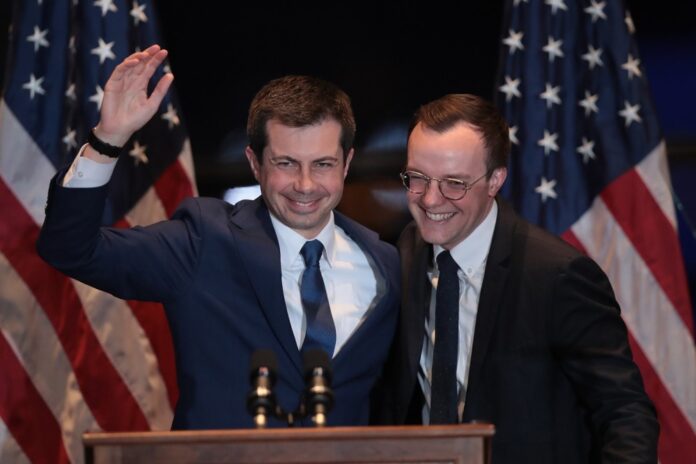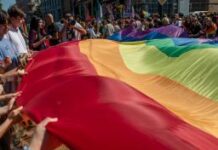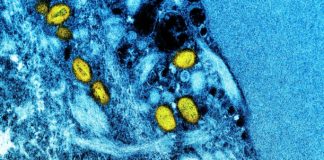
In his new book, Secret City: The Hidden History of Gay Washington, journalist and scholar James Kirchick chronicles the often tragic persecution of gay U.S. government officials during World War II and the Cold War, including one of the 20th century’s most influential statesmen: former U.S. Undersecretary of State Sumner Welles.
Kirchick told FP in an interview that the so-called lavender scare of the early Cold War was worse than the Red Scare. “To be a gay person in Washington in the 1950 and ‘60s was like being a dissident in an East bloc dictatorship,” Kirchick said, which only telegraphed weakness to the United States’ adversary: the Soviet Union. “We were behaving in ways that were redolent of the very enemy we were claiming to fight,” said Kirchick, a senior fellow at the Atlantic Council and author of The End of Europe: Dictators, Demagogues, and the Coming Dark Age.
But the end result, Kirchick writes in his book, was a “quintessentially American story” that saw the gay rights movement triumph—delivering a “message of positive change” to the world by deploying, over generations, its right to speak out and assemble.
This interview has been edited for length and clarity.
Foreign Policy: Tell us about how fears of homosexuality and the oppression of gay officials affected U.S. foreign policy in the period your book covers, which is essentially from the beginning of World War II to the end of the Cold War.
James Kirchick: Homosexuality throughout history has always been associated with bad things. During World War II, I write about how various high-ranking U.S. officials genuinely believed that the Nazi high command was infested with homosexuals, that Nazism was a gay cabal. Then in the 1950s, communism becomes this gay thing, and the Red Scare becomes identified with the so-called lavender scare, when the U.S. federal government purged thousands of homosexuals—real or alleged—on the grounds that they were supposedly vulnerable to communist blackmail.
Then the accusations mounted that aristocratic effete cookie-pushers at the State Department were homosexual, and I write about how homosexuality became a weapon in the bureaucratic warfare between the CIA and the FBI. Accusing your opponents, your ideological adversaries, of sexual degeneracy is a recurring pattern. The Red Scare was at least based in reality. There were a number of communists based in the government, [former U.S. State Department official] Alger Hiss being one of them. The fear of homosexuality was completely irrational. In that sense, the lavender scare was even worse than the Red Scare.
FP: You write about how it was more risky to be a homosexual than a communist during that Cold War period, using examples like Whittaker Chambers, the former communist who embraced the right wing and exposed Hiss.
JK: Yes, a communist could come out, so to speak. You could renounce your communist past and embrace freedom, democracy, capitalism, and the American way. We see that in the character of Whittaker Chambers. Whereas a homosexual is forever damned. I quote a great line in a letter from one gay man who was forced out of office, Robert Waldron, who wrote that once the homosexual has been marked, society “does not permit a return.”
FP: You write at the end of your book: “To assess the full scale of the damage that the fear of homosexuality wrought on the American political landscape, one must take into account not only the careers ruined and the lives cut short, but something even vaster and unquantifiable: the possibilities thwarted.” Tell us about that, particularly with an eye to foreign policy.
JK: The first story in the book is about Sumner Welles, the first government official who’s purged because of his sexual orientation. It’s fair to say he was probably the [Franklin D.] Roosevelt administration official most sympathetic to the plight of Jews in Europe during the Holocaust. If he had not been expelled, would the Roosevelt administration have done more to save the Jews? I don’t know; it might have been such a firmly entrenched policy that nothing would have changed. But it’s something to consider. That’s just one prominent example.
Just think of all the man hours wasted on FBI investigations and civil service investigations. Think of all the wasted talents lost at the CIA and [National Security Agency], of language specialists, spies. If there were two feelings I was left with, the first is that there was just a vast amount of waste. And the second feeling is more positive: It’s gratitude. It’s that we’ve actually come a long way and realized how wasteful and stupid and pointless all this was.
FP: Sumner Welles was probably the most senior official you profile in your book. On the eve of the U.S. entry into World War II, Time magazine lauded him as a “field marshal” in the “War of Brains.” He had enormous influence. He helped draft the Atlantic Charter and some of the most significant foreign-policy initiatives of the last century.
JK: I would point out one in particular: He was author of the eponymous Welles Declaration, which pledged nonrecognition of Soviet annexation of the Baltic states. It’s very relevant today as well because since Russia annexed Crimea, there’s been a lot of pressure to go along with that, but the United States doesn’t recognize it, and that kind of stems from the Welles Declaration. Welles also might have been the man sent to lead the U.S. delegation to the United Nations in San Francisco. But they passed over him for Alger Hiss.
FP: And Welles ended his life a broken man. The question of what happened to the Jews in Europe is interesting, but I was surprised you devote only one line to it in the book. Welles was sympathetic and confirmed the Holocaust to Rabbi Stephen Wise after the Riegner telegram confirming the mass killings of Jews by the Nazis came out. But wasn’t his legacy somewhat ambiguous in that Welles didn’t do more to bring in Jewish refugees to the United States?
JK: It is a fascinating twist of history. It’s hard to say—there may have been gay people who were purged who also might have done bad things. The broader question is how homophobia created a sense of fear and paranoia in the State Department. What does that say about our institutions when you create this atmosphere of fear and paranoia and everyone is ratting each other out for having a mince in their step?
Look at what [former U.S. ambassador to the Soviet Union] Charles Bohlen went through: the internal fighting over the false insinuations that he was homosexual. It’s the first real fight in the Eisenhower administration, and it comes from his own party, from [former Sen. Joseph] McCarthy, who doesn’t even give [former U.S. President Dwight D.] Eisenhower a respite but starts off right away going after his first ambassadorial nominee. It telegraphs a sense of weakness abroad. By creating this whole category of people who were not allowed to serve their country and were considered potential traitors, the United States was basically handing its adversaries a tool to unleash havoc within its own government.
FP: Talk a little more about how and why your book is framed by the Cold War.
JK: So many of these security investigations during the worst years of the Cold War became a giant boondoggle. Scott McLeod, deputy undersecretary of state in the Bureau of Consular Affairs, had hundreds of men under his command processing these anti-homosexual security investigations, and in the 1950s, these took on the character of a Kafkaesque tribunal, where McLeod was basically the judge, jury, and executioner.
This became an alibi for why the United States was not faring well in the early years of the Cold War. The presence of gay men became the excuse for why we lost China, why we lost Eastern Europe, why things were not going our way. It became a conspiracy theory that there was a cabal of communist homosexuals at the State Department. I feel that’s a recurring theme in U.S. politics, a little bit like the Russia-gate obsession: these baroque excuses for not grappling with actual problems. Maybe if we hadn’t had the Red Scare and the lavender scare we would have had a more accurate assessment of our foreign policy in those years instead of this phantom issue.
FP: And if the Cold War hadn’t been so infused with homophobia and all this behind-the-scenes skullduggery over outing people, do you think it might not have been such a messy affair that dragged on for so long?
JK: I don’t know if anyone could answer that. But I do feel confident in saying the United
States would have been better equipped to confront its Cold War adversary if it had not behaved itself in a similar fashion domestically. To be a gay person in Washington in the 1950 and 1960s was like being a dissident in an East bloc dictatorship, where your phone is being tapped, your mail is being opened, your bars are being raided, and dissenters are being put into mental institutions. That’s what the Soviets did: declare political dissidents mentally unfit. We were behaving in ways that were redolent of the very enemy we were claiming to fight.
FP: Let’s move onto today, going beyond the frame of your book. You write that these tragic stories end up with a positive legacy, that the nation is finally in a place where this is no longer an issue and gay people can finally serve in the highest offices of government, including the president’s cabinet right now. What does that say about the United States’ message to the world?
JK: I think it shows several things. One, it’s a quintessentially American story. You have a group of people who are really the most despised minority group in America. Their existence is illegal. They are deemed medical degenerates, psychologically defective. They are condemned from the pulpit of every major religion.
To go from that to where we are today, where we have an openly gay cabinet secretary, how did this amazing transformation take place? It took place through freedom of expression, the First Amendment, freedom of association. It came through the legislative process, the democratic process. It was not a revolution. It was persuasion over many, many years.
I think it’s a very positive American story about the potential for positive change. It seems there is very little that Americans agree on any more. But when it comes to the basic issue of equality for gay people—that seems to be a consensus issue.
FP: Are you concerned about the implications of the Supreme Court’s decision to overturn Roe v. Wade, whether that might threaten the right to gay marriage under the Obergefell ruling, as Justice Clarence Thomas suggested it might?
JK: Stipulating that I am not a constitutional scholar, I believe that the legal justification used to overturn Roe v. Wade does not implicate gay marriage, as the former issue involves potential human life. Also, while public opinion on abortion has remained fairly steady for 50 years, over that same time period, there has not been another issue that has undergone a more dramatic change than gay marriage. Relatedly, there is no political movement to overturn Obergefell v. Hodges.
FP: Your previous book was called The End of Europe—and we’re now in a real struggle for power and influence on that continent, with Russia invading Ukraine. Russian President Vladimir Putin is an avowed homophobe. China still legislates and acts against the open expression of gay sexuality. So what does that message mean in the world today?
JK: I like to look at this through the prism of freedom of expression. Reasonable people can disagree about the morality of gay sexuality or marriage. What I think the United States should stand for is not to push these conservative societies to accept mores that have only been recently accepted here. But these are fundamentally issues of free speech. Russia has basically barred any sort of positive language or speech about homosexuality. This is not just anti-gay; it impacts anyone who speaks out.
FP: How did you come to write such an exhaustive history, which I gather you spent the better part of the last decade on?
JK: I’ve always been fascinated by the Cold War, all aspects of it. And at Yale University, I was fortunate to study under John Lewis Gaddis, the dean of Cold War historians, who is [former U.S. diplomat] George Kennan’s biographer and taught a class in writing biography. We were assigned to write about anyone whose papers were held in the Yale archives. I decided to write mine on Larry Kramer, a very cantankerous but a great figure in U.S. history.
Larry was obsessed with the gay history of Washington, where there have been gay people forever and they haven’t been acknowledged. Washington is a very gay city. The more reading I did, the more I realized it’s always been a very gay city. Statistically, I think it has the highest percentage of self-identified LGBT people.
FP: Why is that, do you think?
JK: Anyone who lives here, you realize it, particularly on Capitol Hill. I talk about the “best little boy in the world” syndrome. [Closeted] gay men in particular, because they’re not pursuing women and are trying to overcompensate for their secret, throw all their energy into extracurricular activities, homework, into pleasing teachers and authority figures. And that was true of me: I was the best little boy, and so were many friends of mine. And those are the sorts of skills that prepare you well for a career in Washington.
There’s a line in the book where I say Washington is simultaneously the gayest and the anti-gayest city in America. Because it demands these skills: discretion, loyalty, a willingness to work 18-hour days, to be available for your boss at the drop of a hat. And as the closet recedes, the whole “best little boy in the world” thing is becoming less of a phenomenon.
So for the period I’m writing about, it brings a lot of these gay people into Washington and yet, at the same time, that’s the tragedy, the paradox: It’s very anti-gay. You couldn’t be openly gay in Washington in the period I’m writing about the same way you could be in New York. In the 1960s, you could be an openly gay person in New York: the fashion world, theater, all sorts of creative industries. San Francisco becomes a gay mecca in the 1970s.
But you couldn’t be an openly gay person in Washington—not until 1975, really, when the Civil Service Commission lifted its ban on gay people. Only in certain right-wing milieus is it still not acceptable. But beyond that, being gay is no longer a problem in the vast majority of institutions of the city.
FP: To the point where a gay person could become president?
JK: Yes. Most gay people would have said a couple of years ago that they never would have imagined a gay candidate like Pete Buttigieg ascending to the prominence that he did. And this change, acceptance of homosexuality, has been so fast that it really is the most rapid and dramatic change of really any social issue that pollsters have recorded. Will I see a gay president in my lifetime? Absolutely.








